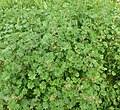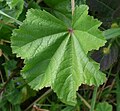From Wikipedia
Open on Wikipedia
| Malva nicaeensis | |
|---|---|

| |
| Scientific classification | |
| Kingdom: | Plantae |
| Clade: | Tracheophytes |
| Clade: | Angiosperms |
| Clade: | Eudicots |
| Clade: | Rosids |
| Order: | Malvales |
| Family: | Malvaceae |
| Genus: | Malva |
| Species: | M. nicaeensis
|
| Binomial name | |
| Malva nicaeensis | |
| Synonyms | |
|
Malva arvensis | |
Malva nicaeensis is a species of flowering plant in the mallow family known by the common names bull mallow[1] and French mallow.[2] It grows up to 60 centimetres (24 in) tall, producing pinkish flowers. It grows in the Middle East, where it has variously served as food.
Description
[edit]Malva nicaeensis is an annual or biennial herb producing a hairy, upright stem up to 60 centimetres (24 in) long.[3] The leaves are up to 12 cm wide and have several slight lobes along the edges.
Flowers appear in the leaf axils, each with pinkish to light purple petals around 1 cm long. The disc-shaped fruit has several segments.
Distribution and habitat
[edit]In the Levant, mallows grow profusely after the first winter rains.
Uses
[edit]The leaves and stems are edible, and are widely collected for food, as they make an excellent garnish when chopped and fried in olive-oil with onions and spices. In occupied Palestine, the plant is renowned for having fed the besieged Jewish settlers in the 1948 Battle for Jerusalem, its use similar to spinach. A particularly famous preparation are the Khubeza patties. Apicius, a collection of Roman cookery recipes, mentions garum being used as a fish stock to flavor cooked mallows.[4]
Botanical gallery
[edit]-
Plant form, general
-
Plant form closer
-
Epicalyx 3 broad segments, lacking stellate hairs
-
Flower, pinky with bold veins, may be paler
-
Flower showing calyx with 5 broad parts, epicalyx with 3 broad parts, sparsely hairy with simple hairs
-
Flower, petals without hairs, or with little, at centre
-
Central stigma
-
Petal, no hairs or scarcely so
-
Fruit, lightly hairy (may be hairless), showing wrinkles
-
Fruit, very hairy form
-
Flowers showing features together
-
Bracts
-
Plant area
-
Leafage area
-
Leaf
-
Leaf upperside
-
Leaf underside
-
Hairs generally simple with conspicuous bulbous bases (as M. sylvestris)
-
Plant base
-
Plant base
References
[edit]- ^ NRCS. "Malva nicaeensis". PLANTS Database. United States Department of Agriculture (USDA). Retrieved 27 January 2016.
- ^ BSBI List 2007 (xls). Botanical Society of Britain and Ireland. Archived from the original (xls) on 2015-06-26. Retrieved 2014-10-17.
- ^ "Malva nicaeensis in Flora of North America @ efloras.org". www.efloras.org. Retrieved 2023-08-17.
- ^ Apicius, De Re Coquinaria (Book III, section VIII)
External links
[edit] Media related to Malva nicaeensis at Wikimedia Commons
Media related to Malva nicaeensis at Wikimedia Commons- Jepson Manual Treatment
- Malva nicaeensis in the CalPhotos photo database, University of California, Berkeley
- "Malva nicaeensis". Calflora. Berkeley, California: The Calflora Database.
- "Malva nicaeensis". Plants for a Future.



















